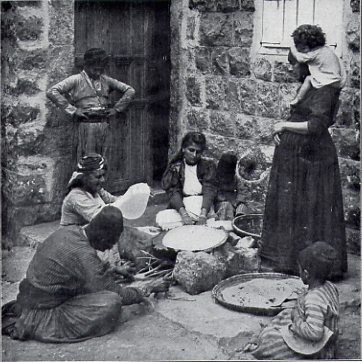
Baking Bread in Syria: The hearth is simply two stones raised on end, over which an iron plate is laid, on which the bread is baked. Source: National Geographic Magazine, XIX(3):171, 1908.
Monthly Archives: July 2008
Despair Drives Suicide Attacks by Iraqi Women
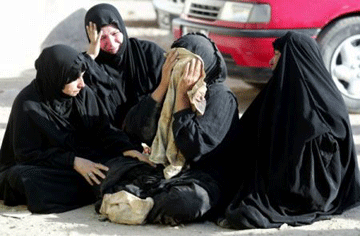
By ALISSA J. RUBIN, The New York Times, July 5, 2008
BAQUBA, Iraq — Wenza Ali Mutlaq walked a bit uncertainly up the long street near the main government offices here on June 22, the hot wind stirring her heavy black abaya. She passed the concrete barricades put up to ward off suicide car bombers and made her way alone, almost haphazardly.
Suddenly, a police car zoomed in. A policeman got out to talk with her. And then their lives were over — torn apart, along with 14 other people, by the huge blast of fire from her concealed explosive vest.
Ms. Mutlaq, who was in her 30s and whose attack was captured on a security video, was the 18th female suicide bomber of the war to strike in Diyala Province, which has been hit by female attackers much more frequently than any other province of Iraq, according to Iraqi police records and the American military. So far, 11 of the 20 suicide bombings carried out by women in Iraq this year have occurred in Diyala. Continue reading Despair Drives Suicide Attacks by Iraqi Women
Virtual Vengeance
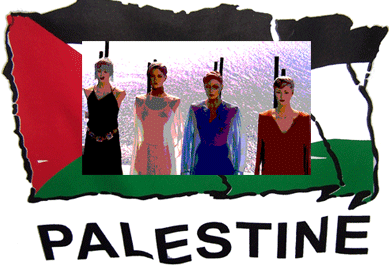
There are more online shoot-em-up games than a person can shake an MK-37 at. The enemies are always the ‘bad guys,’ including Muslim terrorists, who might as well be Nazi or Japanese kamakazi pilots. Of course, video gaming (unlike duck hunting) is all fantasy, I am told. Isn’t it better to shoot fake bullets and rip apart digital bodies online than harm real people (or ducks)? Surely it is. So, if you are interested in seeing the tables turned and are concerned about the usual representation of Palestinians as terrorists, you may find the following video of interest. And remember, it is of course only fantasy.
A Course on the Collision Course
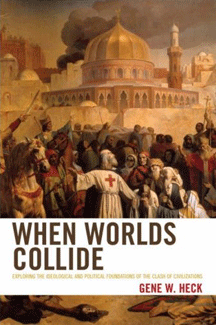
[The aftermath of 9/11 has yielded a stream of books on Islam and violence, so much so that it is rare to find a book about Islam that does not tackle the issue one way or the other. Part of this is due to media promotion of books like Bernard Lewis’s What Went Wrong? and the neocon mantra borrowed from Samuel Huntington’s Clash of Civilizations thesis. A refreshing rejoinder to all this clash talk is provided by Gene Heck in his recent When Worlds Collide: Exploring the Ideological and Political Foundations of the Clash of Civilizations. Here is an excerpt from his Introduction. Webshaykh]
What are the Causes of Modern Middle East Terror?
5. That the so-called Wahhabi movement is often unjustly maligned for alleged doctrines and precepts that do not comport with the actual teachings of the movement’s eighteenth-century founder, Muhammad ibn ‘Abd al-Wahhab, who advocated jihad by peaceful, not militant, means. Continue reading A Course on the Collision Course
Buns and Guns in Beirut

‘Buns and Guns’ Fast Food Eatery Opens in Beirut
Asharq Alawsat, 27/06/2008
BEIRUT, Lebanon, (AP) – At the “Buns and Guns,” the chefs wear military helmets, the food is wrapped in camouflage paper and the advertising slogan is “a sandwich can kill you.”
The fast food eatery with a tongue-in-cheek military theme opened three weeks ago in Beirut’s Hezbollah-dominated southern suburbs and is drawing in residents proud of the Shiite militant group’s battlefield successes.
Done up like a military outpost, the restaurant is located in the heart of a neighborhood heavily pounded by Israel during its 2006 war with Hezbollah, which fought the Israeli military to a standstill.
Neatly stacked sandbags cover the exterior, while the inside is festooned with camouflage nets, defused mortar shells and live ammunition. Employees in military uniforms serve meals to the taped sounds of gunfire as “background music.” Continue reading Buns and Guns in Beirut
Uncovering Evidence of a Workaday World Along the Nile
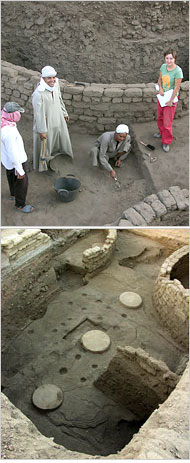
Parts of an administration building, above, and a large silo, top, at the site of an ancient provincial capital on the Upper Nile; Top, N.Moeller/Tell Edfu Project; above, G. Marouard/Tell Edfu Project.
By JOHN NOBLE WILFORD, The New York Times, July 1, 2008
Archaeologists have long fixed their sights on the grandeur that was ancient Egypt, the pyramids, temples and tombs. Few bothered to dig beneath and beyond the monumental stones for glimpses into the living and working spaces of ordinary Egyptians.
That is changing slowly but steadily. In the last two or three decades, excavations have uncovered urban remains and swept aside the conventional wisdom that the Egypt of the pharaohs, in contrast to Mesopotamia, was somehow a civilization without cities.
“We can now confirm that this was not the case,†said Nadine Moeller, an Egyptologist at the Oriental Institute of the University of Chicago. Dr. Moeller was speaking of her own recent findings, as well as those of other excavators who practice what is known as settlement archaeology. Continue reading Uncovering Evidence of a Workaday World Along the Nile